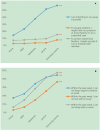Fear in the Chinese Population: Influential Patterns in the Early Stage of the COVID-19 Pandemic
- PMID: 34140908
- PMCID: PMC8204111
- DOI: 10.3389/fpsyg.2021.567364
Fear in the Chinese Population: Influential Patterns in the Early Stage of the COVID-19 Pandemic
Abstract
Major global public health emergencies challenge public mental health. Negative emotions, and especially fear, may endanger social stability. To better cope with epidemics and pandemics, early emotional guidance should be provided based on an understanding of the status of public emotions in the given circumstances. From January 27 to February 11, 2020 (during which the cases of COVID-19 were increasing), a national online survey of the Chinese public was conducted. A total of 132,482 respondents completed a bespoke questionnaire, the Emotion Regulation Questionnaire, and the Berkeley Expressivity Questionnaire (BEQ). Results showed that at the early stage of the COVID-19 epidemic, 53.0% of the Chinese population reported varying degrees of fear, mostly mild. As seen from regression analysis, for individuals who were unmarried and with a relatively higher educational level, living in city or area with fewer confirmed cases, cognitive reappraisal, positive expressivity and negative inhibition were the protective factors of fear. For participants being of older age, female, a patient or medical staff member, risk perception, negative expressivity, positive impulse strength and negative impulse strength were the risk factors for fear. The levels of fear and avoidant behavior tendencies were risk factors for disturbed physical function. Structural equation modeling suggested that fear emotion had a mediation between risk perception and escape behavior and physical function disturbance. The findings help to reveal the public emotional status at the early stage of the pandemic based on a large Chinese sample, allowing targeting of the groups that most need emotional guidance under crisis. Findings also provide evidence of the need for psychological assistance in future major public health emergencies.
Keywords: COVID-19; Chinese population; fear; mental health; pandemic.
Copyright © 2021 Chen, Sun, Xie, Zhang, Shen, Chen, Yuan, Shi, Qin, Liu, Wang and Dai.
Conflict of interest statement
The authors declare that the research was conducted in the absence of any commercial or financial relationships that could be construed as a potential conflict of interest.
Figures




References
LinkOut - more resources
Full Text Sources
Research Materials

